Although there was a rare named tropical storm in April this year, that doesn’t change the date of the official beginning of the 2017 Hurricane Season. That remains June 1, as always. Just because a system blooms into an actual Tropical Storm or Hurricane earlier in the year, it doesn’t change the start of the season. But, it does give us a slightly unusual start for 2017.
Will any names make history this year, like Katrina, Sandy, and Matathew did in recent years? What are the names for this year, and how were they chosen? The list is ready, and has been for years. You’ll find it here.
When a low pressure system strengthens to Tropical Storm status, it is named. Some of those named storms get even stronger and turn into hurricanes. How many of those will turn into hurricanes?
I follow several prominent hurricane forecasting organizations. They all make hurricane season predictions about how active they think the tropics will be in the coming months.
What are they saying? I've made a handy chart to show the forecast numbers from Colorado State University, Tropical Storm Risk, Weather Services International (The Weather Channel), Global Weather Oscillations, and, of course, the National Hurricane Center.
How accurate are these preseason forecasts? Read on to find out.


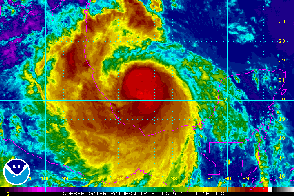


 Wondering if the tropics will be in the news a lot this year? The experts have read their crystal balls, and some of them seem to think so! OK - maybe they don't really read a crystal ball. A whole lot actually goes into these hurricane season forecasts.
Wondering if the tropics will be in the news a lot this year? The experts have read their crystal balls, and some of them seem to think so! OK - maybe they don't really read a crystal ball. A whole lot actually goes into these hurricane season forecasts.




 Yes, the season begins on June 1st, and ends on November 30th. But tropical weather systems can't read calendars. Sometimes there are early or late Storms
Yes, the season begins on June 1st, and ends on November 30th. But tropical weather systems can't read calendars. Sometimes there are early or late Storms There are exactly 21 storm names on each of the six lists used for yearly tropical storm names.
There are exactly 21 storm names on each of the six lists used for yearly tropical storm names.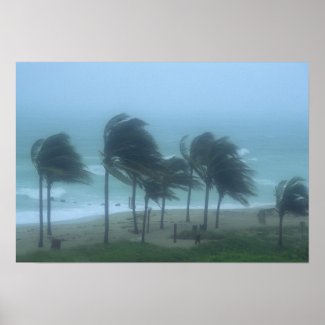



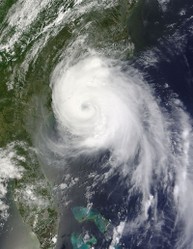

 Gold Heart Locketson 12/30/2015
Gold Heart Locketson 12/30/2015
 Ships and Boats on Electrical Wall Plateson 11/12/2015
Ships and Boats on Electrical Wall Plateson 11/12/2015
 Nautical Jigsaw Puzzles: Ships and the Seaon 11/04/2015
Nautical Jigsaw Puzzles: Ships and the Seaon 11/04/2015
 Tropical Flower Christmas Ornamentson 11/03/2015
Tropical Flower Christmas Ornamentson 11/03/2015

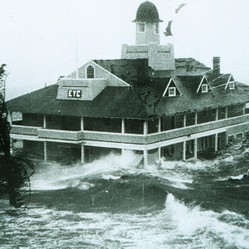
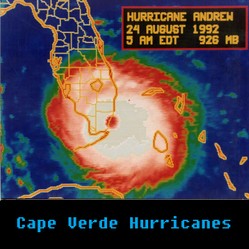
Comments
Early storms might be a good thing. One thing these storms do is churn the waters, bringing up cooler water to the surface. This does not last but can help in the short time. Of course tropical storm Cindy came before hurricane Katrina, but was rather weak. Why did Katrina not cool the gulf and prevent Rita and Wilma? Well, Rita tracked farther south, and Wilma even farther south, so they did not weaken due to the churning. Their tracks did not interact enough.
June 20, 2016: A record has already been tied this season. June is usually a fairly inactive month for tropical systems, but this year is different. 2016 marks only the fourth time in history that THREE named storms have formed in the month of June. The other years in which that happened were 1886, 1936, and 1968. All even numbered years.... hmmm.
In the last couple of years, they've narrowed the cone overall... so, in that sense, they have recently gotten more accurate overall. I don't think the shrinking of the forecast cone is something that most people have noticed, however,
CruiseReady, It's interesting that retiring hurricane names and sports numbers are honors, for the casualties in the first case and the bearers in the second. Of course, one wants there to be more athletic retirements than weather, but it's still comforting for survivors to know that their loved ones are being remembered.
In another direction, I always chuckle over the climatologist's and meteorologist's excuse that forecasts get more accurate the closer the data get to the event: so one hopes!
I do, indeed, love it here! Lucky for you, those remnants don't make it over to you all that often. Then, you would have to worry about both summer and winter storms. I think the winter ones alone would do me in.
We in Britain sometimes get the remnants of hurricanes. When we do their path is to come up through the Western approaches south of Ireland and come ashore in central southern England, then they track North East before decaying. In the North West of England where I am, we get the sides of the storm. I am more personally concerned about winter storms in the North Atlantic, which can badly hit Northern Britain.
I can see why you love living near the sea, Cruiseready, for I have a friend who grew up in such an environment and now deeply misses it. My daughter lives near a sheltered stretch of the coast of Anglesey in North Wales and loves where she lives.
I think it would be much harder to live far inland, away from the sea breeze and salt air! And I can't imagine living with the threat of tornadoes, which seem to be much more frequent, and give a lot less warning of their approach than a tropical storm.
Interesting article. Like Pam, I learned a few things, and it was an enjoyable read, even though it talked about devastating storms and hurricanes. It must be really hard to live on coastal areas affected by such storms.
Many thanks for the kind words. Yes, and they really had to use a lot of those 'extra' names in 2005. Here's hoping they never have to do THAT again.
I also meant to say that this page is interesting and well done. I did not know how they named storms once they ran out of alphabet letters.